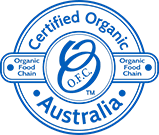GENERAL EXPORTING INFORMATION
OFC can authorise your OGC’s even if you are not an OFC certified operator.
There are significant penalties imposed by the Federal Government for exporting certified organic/bio-dynamic products (over 10kg or 10 litres per consignment) without an OGC. You could be issued with a penalty starting at $316,800.
Exporting over 10 kg or 10 litres of certified organic product from Australia requires an Organic Goods Certificate (OGC). This is referred to as a Government to Government certificate.
The Export Control (Organic Goods) Rules 2021 prohibits the export of certified organic produce from an Australian territory, or from a part of an Australian territory, unless an OGC has been issued for the product, regardless of the importing country requirements. The primary objective of the export organic program is to ensure that organic and bio-dynamic products exported from Australia meet the requirements of importing countries, ensuring the integrity of that international organic market access.
These documents are a requirement of the Australian Government and require authorisation by an approved certification body such as OFC.
If you are exporting certified organic products, all stages of the organic chain, including producers, importers, wholesalers, retailers and exporters, must be certified by a Department of Agriculture, Fisheries and Forestry approved certifying body. All operations from production through to exportation must be verified to the point of final packaging.
On this page we list various export certificates that we can authorise for you.
If you are looking for information on organic standards, certification schemes and import regulations in different countries to understand the requirements for importing to those organic markets, this website might be useful.
The OGC must be completed by the exporter and approved by OFC prior to the shipment leaving Australia.
EXPORTING ORGANIC PRODUCTS TO THE EUROPEAN UNION (EU)
For the purposes of importing certified organic product to the EU from Australia, Australia is classified as a ‘Third Country’. Authority for this is listed in Commission Regulation (EC) 2021/2325, Article 18. Under the equivalence agreement between the EU and Australia, certain products may be imported as certified organic into the EU. These are listed in Annexe III of Commission Regulation (EC) 2021/2325 and include unprocessed plant products, processed agricultural products for use as food (excluding wine and yeast) [composed essentially of one or more ingredients of plant origin] and vegetative propagating material and seeds for cultivation.
If you wish to export wine, yeast, livestock feed, live livestock and livestock products (including apiculture products) to the EU, you cannot do this solely with OFC National Standard certification. Separate EU certification is required and OFC does not offer this.
Information about importing certified organic products to the EU from Australia can be found here:
Importing organic produce to the EU
Legislation for the organics sector
Rules for organic production and products
Two forms need to be completed for each consignment: the EU COI and the Australian EX1401.
EXPORTING ORGANIC PRODUCTS TO GREAT BRITAIN
The Certificate of Inspection for Import of Products from Organic Production into Great Britain (GB COI) must be used for all goods declared as organic and imported into Great Britain. Market Access Advice 2020-07 covers all of the requirements, the main points listed here.
Two forms need to be completed for each consignment: the GB COI and the Australian EX1401.
- A GB COI system is in place for organic goods exported to Great Britain.
- A hardcopy GB COI is required to be sent to the relevant Port Health Authority in Great Britain in order to complete the import clearance process.
- Prior to export from Australia:
1) The GB COI must be approved by an Approved Certifying Body such as OFC.
2) An Australian export certificate EX1401 must be approved by an Approved Certifying Body such as OFC. - The importer in Great Britain needs to complete import documentation outside of TRACES NT.
- The import documentation and original hardcopy GB COI then needs to be provided to the relevant Great Britain Port Health Authority.



